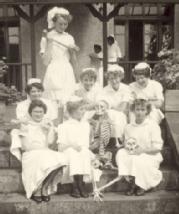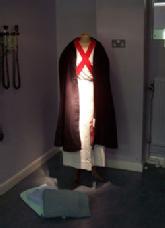Nursing
 ‘I always wanted to be a nurse, right from when I was a young girl’
‘I always wanted to be a nurse, right from when I was a young girl’
In the years following World War Two, when there was a shortage of nurses, a young woman could begin working at Coventry and Warwickshire Hospital as a cadet. Perhaps as young as 15 years old, she would spend one day each week at Henley College, receiving instruction in maths, biology and other subjects. The rest of her time was spent on the wards of the hospital.
Most of what a cadet learned, she learned through hands on experience, but under the watchful and fearsome gaze of the Matron. A cadet’s responsibilities were varied, ranging from cleaning out bedpans and preparing meals for the patients, to making beds and helping nurses with simple medical procedures. It was hard work, and discipline was strict. There seemed to be a rule for everything – one even prohibited scratching your legs – and getting caught breaking the rules would earn you a harsh telling-off from the Matron.
Cadets would go on to do their nurse training once they had turned eighteen. This took place in the old Nurses Home, which still exists today. Periods of training alternated with blocks of time spent on the wards, and at the end of each year there were exams to be passed.
There are no longer cadets, and the education a student nurse receives has changed. As well as undertaking more academic study, student nurses today are more gradually introduced to activity on the wards. There are also a greater number of medical specialisms to choose from.
 ‘One big happy family’
‘One big happy family’
Despite the hard work, and sometimes harsh discipline, cadets and nurses at Coventry and Warwickshire Hospital in the postwar decades – and indeed right up to the closing of the hospital – greatly enjoyed their work. The hospital was a community. Nurses, cleaners, consultants – everyone had a job to do, but equally staff were willing to pitch in and help each other out. ‘One big happy family,’ was how one nurse described the experience.
In the latter part of the twentieth century a number of changes were made to how hospitals in the UK were organised, and many nurses viewed these changes with displeasure. One change was the subdivision of open wards into small rooms for between one and four beds. The reason for this change was to reduce the risk of infection spreading from patient to patient. But the loss of open wards is also thought to have made hospitals less friendly and sociable places. Nursing, some felt, was becoming less about developing relationships with patients and more about getting people in and out quickly and efficiently.
<- previous stage of exhibition | next stage of exhibition ->
Exhibition tour:
Nursing
